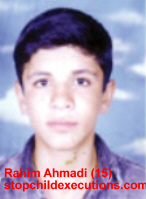committing suicide so he killed her to minimise her suffering. On hearing Bahman Salimian’s unusual motive for the murder the trial judge ordered that Bahman Salimian be psychologically assessed. Experts concluded that he was suffering from a psychological disorder and, accordingly, the judge sentenced him to five years’ imprisonment and the payment of diyeh (financial compensation, also called ‘blood money’) to be paid by his parents. Some members of the grandmother’s family appealed the sentence and demanded the death sentence for Bahman Salimian’s crime and Branch 33 of the Supreme Court overturned the lower court’s verdict and he was sentenced to qesas.
On 25 August, the Head of the Judiciary of Esfahan province, Gholam Reza Ansari, announced that Bahman Salimian’s execution was to be suspended as two of his uncles had pardoned him. Gholam Reza Ansari ordered the relevant officials to try as hard as possible to obtain the pardon of the remaining uncle, which would spare Bahman Salimian from execution.
Bahman Salimian has spent the last 12 years in prison due to the disagreement within the victim’s family regarding his pardon or execution. Under the Iranian qesas law, if one member of the victim’s family refuses to pardon the accused and, the other family members have received the appropriate amount of diyeh, then the death sentence will be implemented.
BACKGROUND INFORMATION
Since 1990 Iran has executed at least 37 juvenile offenders, eight of them in 2007 and six so far in 2008.
The execution of juvenile offenders is prohibited under international law, as stated in Article 6 (5) of the International Covenant on Civil and Political Rights (ICCPR) and the Convention on the Rights of the Child (CRC), to which Iran is a state party to and so has undertaken not to execute anyone for crimes committed when they were under 18.
In Iran a convicted murderer has no right to seek pardon or commutation from the state, in violation of Article 6(4) ICCPR. The family of a murder victim have the right either to insist on execution, or to pardon the killer and receive financial compensation.
For more information about executions of child offenders in Iran, please see: Iran: The last executioner of children (MDE 13/059/2007, June 2007), http://web.amnesty.org/library/index/engmde130592007
RECOMMENDED ACTION: Please send appeals to arrive as quickly as possible, in Persian, Arabic, English or your own language:
– expressing concern that Bahman Salimian is at risk of execution for a crime committed when he was under 18;
– calling on the authorities to commute his death sentence;
– reminding the authorities that Iran is a state party to the International Covenant on Civil and Political Rights (ICCPR) and the Convention on the Rights of the Child (CRC), which prohibit the use of the death penalty against people convicted of crimes committed when they were under 18.
APPEALS TO:
Head of the Judiciary
Ayatollah Mahmoud Hashemi Shahroudi
Howzeh Riyasat-e Qoveh Qazaiyeh / Office of the Head of the Judiciary
Pasteur St., Vali Asr Ave., south of Serah-e Jomhouri, Tehran 1316814737, Islamic Republic of Iran
Email: info@dadgostary-tehran.ir (In subject line write: FAO Ayatollah Shahroudi)
Salutation: Your Excellency
COPIES TO:
Director, Human Rights Headquarters of Iran
His Excellency Mohammad Javad Larijani
Howzeh Riassat-e Ghoveh Ghazaiyeh (Office of the Head of the Judiciary)
Pasteur St, Vali Asr Ave., south of Serah-e Jomhouri, Tehran 1316814737, Iran
Fax: +98 21 3390 4986 (please keep trying)
Email: fsharafi@bia-judiciary.ir (In the subject line: FAO Mohammad Javad Larijani)
int_aff@judiciary.ir (In the subject line: FAO Mohammad Javad Larijani)
and to diplomatic representatives of Iran accredited to your country.
PLEASE SEND APPEALS IMMEDIATELY. Check with the International Secretariat, or your section office, if sending appeals after 23 October 2008.

 Source: Etemaad Newspaper- Iran
Source: Etemaad Newspaper- Iran Source: Etemaad Newspaper- Iran
Source: Etemaad Newspaper- Iran
